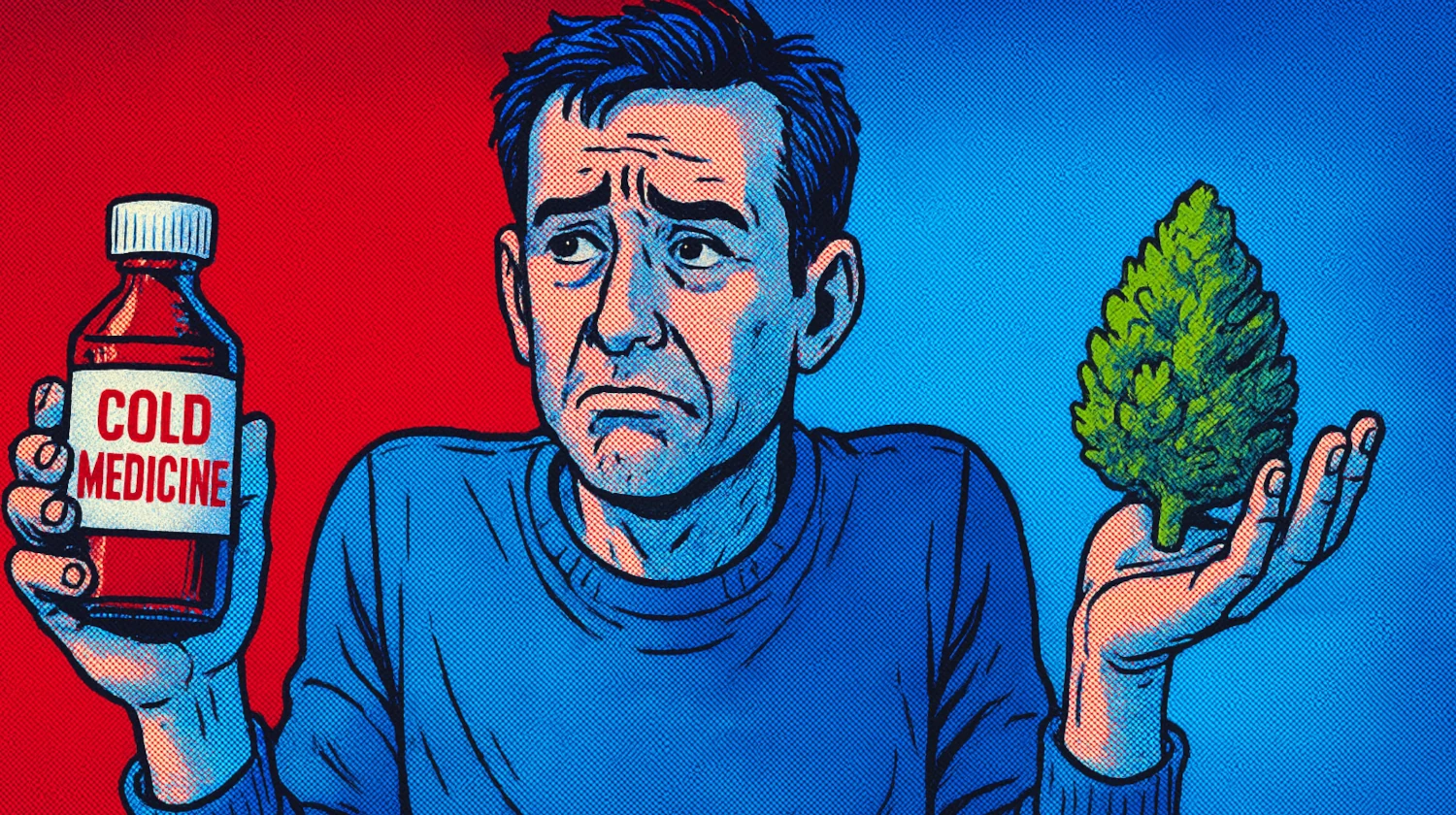Cannabis is a widely used drug for both recreational and medicinal purposes. Millions of people use cannabis products on a daily basis. However, some individuals have reported experiencing swollen lymph nodes after smoking weed.
Such reports led to speculation and concern over whether cannabis use can cause inflammation in the lymphatic system. Is there any truth to these claims? Could cannabis use have some adverse effects on the lymph nodes?
To better understand what’s going on, it’s necessary to delve into the relationship between cannabis use and swollen lymph nodes, exploring the potential causes, symptoms, and treatments. So, if you are curious about the impact of smoking cannabis on your lymph nodes, keep reading!
What Are Lymph Nodes?
The lymphatic system is an essential part of the immune system responsible for protecting the body from harmful substances and infections. It comprises a network of vessels and tissues that transport lymph, a clear fluid containing white blood cells, throughout the body.
Lymph nodes are small bean-shaped structures that are found throughout the lymphatic system. They act as filters, trapping bacteria, viruses, and other harmful substances before they can spread to other parts of the body.
Because of their importance, lymph nodes are located in various places, including the neck, armpits, groin, and abdomen.
When referring to swollen lymph nodes, we are talking about lymph nodes that have enlarged because of an infection or inflammation. Sometimes, swollen lymph nodes can be a reliable indicator of illnesses, or even cancer.
While there have been some anecdotal reports of cannabis use leading to swollen lymph nodes, it is not a common symptom. And while swollen lymph nodes caused by cannabis use can be mistaken for a symptom of another illness, it is usually not a cause for concern.
However, if a person is experiencing swollen lymph nodes with other symptoms, such as fever or fatigue, it is critical to seek medical attention to rule out any underlying conditions.
Can Smoking Weed Cause Swollen Lymph Nodes?
The answer to whether smoking weed can cause swollen lymph nodes is not entirely clear. There is very limited research on this topic. In fact, there is still currently little research on cannabis use in general, let alone its effects on specific areas of the body.
One medical case study published by physicians at the Cancer Institute of New Jersey reported “a rare case of a 22-year-old man who presented with bilateral neck lymphadenopathy [swollen lymph nodes], fatigue, and sore throat without significant medical or family history. The patient had smoked one marijuana joint three times a week for three years but no cigarettes.” This case study stated that a “final diagnosis of small-cell lung cancer was reached. Although rare, a small-cell lung cancer in this patient should alert the physician that cannabis smoking may be a risk factor for lung cancer.”1
Nevertheless, as stated by the case study itself, the case of this 22-year-old man was very much a rare one. Not only that, many other studies have been conducted on the potential link between cannabis use and increased risk of cancers (We’ll touch on this in later sections), and most have found no definitive link.
While the current research on the potential link between cannabis use and swollen lymph nodes is sparse, other studies have found that heavy cigarette smokers may have a higher risk of enlarged lymph nodes.2 While it’s true cannabis smoke is still an irritant that may be damaging to inhale, cigarette smoke contains hundreds of harmful chemicals, many of which cause cancer and other adverse health symptoms such as swollen lymph nodes.3
So, such studies should be taken with a grain of salt, and it’s likely not accurate to assume cannabis smoke has the same effects on the lymph nodes as cigarette smoke.
It is also worth noting that various factors can cause swollen lymph nodes. Infections and everyday illnesses, like colds and the flu, are most common but swollen lymph nodes can also be caused by autoimmune disorders and cancer. Therefore, it is essential to consider all potential causes when assessing your symptoms.
Ultimately, further research is needed to determine how cannabis use may contribute to swollen lymph nodes in humans. Until then, it is best to be cautious and consult a medical professional if experiencing any symptoms of illness alongside swollen lymph nodes.
How Does Cannabis Affect the Lymphatic System?
The exact mechanisms by which cannabis affects the lymphatic system are still not fully understood.
Smoking cannabis might lead to respiratory symptoms, such as coughing and wheezing, which may be mistaken for symptoms of swollen lymph nodes. Holding in smoke for an extended period can also irritate the throat and lungs, which can cause coughing and chest discomfort.
Individuals who use cannabis have anecdotally reported experiencing pain, swelling, or discomfort in various parts of the body, including the armpits, neck, and groin. These symptoms may be related to inflammation in the lymphatic system or other underlying health conditions.
It is important to note that these symptoms can also be caused by other factors, such as infections, injuries, underlying conditions, or hormonal changes. Therefore, it is important to consider all potential causes when evaluating symptoms and to consult a medical professional if experiencing any concerning symptoms.
So, long story short, more research is needed to fully understand the relationship between cannabis use and the lymphatic system.
Is There a Link Between Weed and Lymphoma?
Lymphoma is a type of cancer that affects the lymphatic system, which fights infections and maintains fluid balance in the body.
There are two main types of lymphoma: Hodgkin’s lymphoma and non-Hodgkin’s lymphoma. Lymphoma can develop for many reasons, including genetic factors, exposure to certain chemicals or radiation, and infections such as HIV.
There is currently no conclusive evidence suggesting cannabis use directly causes lymphoma. Not only that, many studies have failed to find any definitive or strong link between cannabis use and an increased risk of cancer.
It is also worth noting that many cancer patients, including lymphoma patients, have used cannabis to ease symptoms related to their condition and its treatment.4
Some cancer patients have reported using cannabis to reduce nausea and vomiting caused by chemotherapy, as well as to ease pain and improve appetite.5,6 Some research has suggested that cannabis may have anti-cancer properties and could be used as a complementary treatment alongside traditional cancer therapies.7
At the end of the day, it is necessary to consult a medical professional when considering the use of cannabis as a treatment for cancer or any other medical condition. While some cancer patients may find symptom relief from cannabis use, it is not a substitute for conventional cancer treatment and may not be suitable for everyone.
So, while there is no clear evidence to suggest that cannabis use causes lymphoma, the potential risks and benefits of cannabis use for cancer patients should be contemplated on a case-by-case basis.
What to Watch Out For
When consuming cannabis, it’s essential to be aware of potential signs and symptoms warranting medical attention. While cannabis is generally considered safe for most individuals, some may experience adverse effects, especially with heavy or prolonged use.
Here are some signs and symptoms to be cautious of when consuming cannabis:
- Respiratory symptoms: Cannabis smoke can irritate the respiratory system and may cause symptoms such as coughing, wheezing, chest tightness, and difficulty breathing. Individuals with pre-existing respiratory conditions, like asthma, may be more susceptible to these effects.
- Lymph node swelling: There is no clear evidence that cannabis use directly causes swollen lymph nodes. But if you notice persistent swelling in your lymph nodes, especially in the neck, armpit, or groin, seek medical attention as it may indicate an underlying health issue.
- Mental health changes: Some individuals may experience symptoms of increased anxiety, paranoia, mood swings, or changes in behavior, particularly at high doses of THC. While these symptoms aren’t common, if you notice significant changes in your mental health or well-being after consuming cannabis, consult a healthcare professional right away.
- Other adverse effects: Cannabis use may also cause other side effects such as dizziness, nausea, vomiting, dry mouth, or changes in heart rate. If you experience severe or persistent adverse effects, seek medical attention.
Always follow recommended dosages and usage guidelines, and be aware of potential adverse effects when smoking. If you experience any distressing symptoms or have any health concerns before, during, or after smoking, do not hesitate to seek medical attention for proper evaluation and care. They can provide appropriate recommendations based on your specific health history and circumstances.
Frequently Asked Questions (FAQs)
Can cannabis use directly cause swollen lymph nodes?
There is no clear evidence that cannabis use causes swollen lymph nodes. However, persistent swelling in the lymph nodes, especially in the neck, armpit, or groin, should be evaluated by a healthcare professional as it may indicate an underlying health issue.
Can cannabis be used to treat lymphoma or other cancers?
While some patients may use cannabis to find relief from symptoms of lymphoma or other cancers, it’s important to note that cannabis is not a proven cure for cancer. It’s crucial to consult with a healthcare professional for appropriate cancer treatment options.
What are the potential adverse effects of cannabis use?
Cannabis use, especially in larger doses, may cause respiratory symptoms such as coughing, wheezing, and difficulty breathing, as well as mental health changes like increased anxiety or mood swings. Other potential adverse effects may include dizziness, nausea, vomiting, dry mouth, and changes in heart rate.
When should I see a doctor if I have health concerns related to cannabis use?
If you experience persistent or severe adverse effects from cannabis use, such as respiratory symptoms, mental health changes, or concerning physical symptoms, it’s important to seek medical attention from a qualified doctor for proper evaluation and care.
Can cannabis interact with other medications or health conditions?
Yes, cannabis can interact with other medications and health conditions. Be sure to disclose your cannabis use to your healthcare provider, especially if you are taking other medications, have pre-existing health conditions, or will be undergoing surgery to avoid potential interactions and ensure safe and effective healthcare management.
References
1. Kothadia JP, Chhabra S, Marcus A, May M, Saraiya B, Jabbour SK. Anterior Mediastinal Mass in a Young Marijuana Smoker: A Rare Case of Small-Cell Lung Cancer. Case Reports in Medicine. 2012;2012:e754231. doi:https://doi.org/10.1155/2012/754231
2. Kirchner J, Kirchner EM, Goltz JP, Lorenz VW, Kickuth R. Prevalence of enlarged mediastinal lymph nodes in heavy smokers—a comparative study. European Radiology. 2011;21(8):1594-1599. doi:https://doi.org/10.1007/s00330-011-2111-9
3. Abuse NI on D. What are marijuana’s effects on lung health? National Institute on Drug Abuse. Published July 2020. https://nida.nih.gov/publications/research-reports/marijuana/what-are-marijuanas-effects-lung-health
4. Sarid N, Zada M, Lev-Ran S, et al. Medical Cannabis Use by Hodgkin Lymphoma Patients: Experience of a Single Center. Acta Haematologica. 2018;140(4):194-202. doi:https://doi.org/10.1159/000493567
5. Rocha FM, Stefano SC, Haiek RC, Oliveira LM, Silveira DD. Therapeutic Use of Cannabis Sativa on Chemotherapy-Induced Nausea and Vomiting among Cancer Patients: Systematic Review and Meta-Analysis. Centre for Reviews and Dissemination (UK); 2008. Accessed April 26, 2023. https://www.ncbi.nlm.nih.gov/books/NBK75693/
6. Meng H, Dai T, Hanlon JG, Downar J, Alibhai SMH, Clarke H. Cannabis and cannabinoids in cancer pain management. Current Opinion in Supportive & Palliative Care. 2020;14(2):87-93. doi:https://doi.org/10.1097/spc.0000000000000493
7. Tomko AM, Whynot EG, Ellis LD, Dupré DJ. Anti-Cancer Potential of Cannabinoids, Terpenes, and Flavonoids Present in Cannabis. Cancers. 2020;12(7):1985. doi:https://doi.org/10.3390/cancers12071985
The information in this article and any included images or charts are for educational purposes only. This information is neither a substitute for, nor does it replace, professional legal advice or medical advice, diagnosis, or treatment. If you have any concerns or questions about laws, regulations, or your health, you should always consult with an attorney, physician or other licensed professional.




